 |
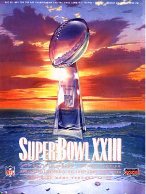 |
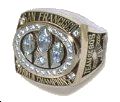 |
January 22, 1989 - Joe Robbie Stadium, Miami
San Francisco
49ers 20
Cincinnati
Bengals 16
For the first time in several years, the 1989 Super Bowl was a game worthy of its name.
Super Bowl XXIII began with hopes that it would not be another in a recent string of one-sided yawners dominated by the National Football Conference. It wound up being the most exciting Super Bowl ever, ending with the most memorable scoring drive this extravaganza had ever witnessed.
Of course, as Montana huddled the 49ers near their own 8-yard line with 190 seconds left in the game, the last thing on his mind was the welfare of the Super Bowl. He had a more immediate problem: a three-point deficit on the scoreboard and the prospect of moving 92 yards against a Cincinnati Bengal defense that had surrendered only one touchdown all evening despite the loss of star nose tackle Tim Krumrie in the opening minutes. There really was no reason to think that Montana would have any more success now-except that this was still Joe Montana, the most remarkable pressure quarterback of the 1980s.
Someone in the 49ers' huddle said something about keeping their poise. Montana, who never has been one for pep talks, told everyone, "Let's go, be tough." That was it. The 49ers were trailing, 16-13, and he wanted a field goal to send the game into overtime. What he did instead was to carve out a piece of Super Bowl history.
After so many years of lopsided games -- the last Super Bowl decided by less than 10 points had been seven years before, when, ironically,
San Francisco defeated Cincinnati, 26-21-this Super Bowl already had been refreshingly tense, a rare defensive battle in an era of offensive routs. The Bengals' bully-boy offense hadn't even scored a touchdown, yet Cincinnati still led on a 93-yard Stanford Jennings kickoff return and three Jim Breech field goals. Now it was Montana's turn to see if he could salvage a victory for the favored 49ers on this mild evening before a sellout crowd of 75,129 in Miami's Joe Robbie Stadium.
"When you see Joe do it in the clutch as much as we have, you think he can do it every time," 49ers offensive tackle Bubba Paris said. "He's very businesslike. Doesn't say much; just goes about his work."
Many of the Bengals stood nervously along their bench as the 49ers began their final drive. A teammate told receiver Cris Collinsworth, "We've got 'em now." Collinsworth shot back: "Have you taken a look at who's quarterbacking the 49ers?"
No one had to be reminded that Montana was the same man who, seven years earlier, had inspired a last-minute march against Dallas in the NFC title game that ended successfully with "The Catch" by Dwight Clark, a play that has become part of Bay Area sports lore. But this time, the stakes were greater and Montana had even less time in which to work his magic.
And he still hadn't quite figured out Cincinnati's puzzling defense. The Bengals had given up lots of yards -- San Francisco would finish with 454 in all-but had allowed only one touchdown, a 14-yard scoring pass to wide receiver Jerry Rice early in the fourth quarter. They had frustrated the 49ers, and Montana especially was displeased with some of his earlier passing reads, which he thought had cost his team at least two touchdowns.
Montana came out this time hoping the Bengals would continue to play man-to-man pass coverage. They did, and he immediately took advantage as he directed the 49ers' hurry-up offense, going quickly down the middle first to running back Roger Craig for eight yards and then to tight end John Frank for seven more and a first down. After Rice caught a seven-yard pass in the flat, Craig was tripped up for a one-yard gain, bringing up third and two at the 49er 31-yard line.
Montana, who was calling his own signals, sent Craig off right guard. Craig read the block of guard Guy McIntyre, who nudged Skip McClendon enough to free Craig for a four-yard gain and a first down at the 35. The 49ers then called their first timeout with 1:54 remaining.
"We were functioning like a machine by then," Paris said. "You could feel the intensity in the huddle. It was happening again."
The Bengals were getting anxious. Even safety David Fulcher, who had played a tremendous game, sensed that the game might be slipping away. "They were in a spread and we were in a nickel," he said, "and things open up for an offense when you only rush two or three men. They executed well, and maybe you could say things were happening so fast that we didn't get our feet settled."
Things would happen even faster. After the timeout, Montana connected with Rice on a down-and-out pattern past cornerback Eric Thomas for 17 yards. He then hit Craig for another 13 yards. With the ball at the Bengal 35, Montana threw incomplete.
"I probably should have called timeout," he said. "From all the yelling and audibling I was doing, I was getting pretty excited and I started to have a hard time catching my breath. That never happened before. But I went ahead anyway."
A completion to Craig on a curl pattern over the middle was nullified by a penalty on center Randy Cross for being illegally downfield before the throw. That potentially crippling 10-yard penalty put the 49ers back on the Cincinnati 45, but Montana promptly threw a deep slant-in to Rice, who managed to slide between cornerback Lewis Billups, Fulcher and Ray Horton, the Bengals' fifth defensive back, to snare the ball and then run another 14 yards for a 27-yard gain. With their fifth first down of the drive, the 49ers had the ball at the Cincinnati 18-yard line. "That's when I started thinking touchdown," Montana said.
Said the veteran Cross, who retired after the game: "Even if we had to pick up Joe en masse and carry him over the goal line, we were going to get a touchdown."
On first down, Montana again found Craig over the middle for eight more yards. With 39 seconds to go and the ball 10 yards from the goal line, the 49ers called their second timeout.
"We had noticed (in films) that near the goal line, the Bengals like to bracket their coverage, doubling the outside receivers," Montana said. "We wanted to use our wide receivers to spread it out and open up the middle."
The play call was 20 Halfback Curl X-Up. Craig, running yet another curl pattern, was the primary target. But the play got off to a bad start when Craig and fullback Tom Rathman lined up in the wrong spots-Craig on the right side of the backfield, Rathman on the left, rather than vice versa.
"When we broke the huddle I saw Tom line up on the left," Craig said, "and that wasn't the time to argue, so I just lined up on the right. The fact that I was on the wrong side didn't even affect Joe. He is so smooth, it's incredible. He looked at me first, just as he's supposed to, despite the fact I was on the wrong side. I was double-covered, so he went to the next guy."
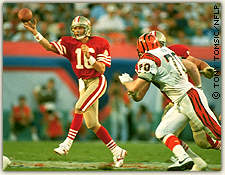 "The
next guy" was wide receiver John Taylor, who ran a few strides straight
into the end zone, nodded his head as if he would cut outside, then turned
slightly inside and moved to the back of the end zone. With Rice running
as a decoy into the Bengals' two-deep zone, Taylor had only Horton to beat.
Horton was late coming over and Montana rifled a strike to Taylor for a
game-winning touchdown.
"The
next guy" was wide receiver John Taylor, who ran a few strides straight
into the end zone, nodded his head as if he would cut outside, then turned
slightly inside and moved to the back of the end zone. With Rice running
as a decoy into the Bengals' two-deep zone, Taylor had only Horton to beat.
Horton was late coming over and Montana rifled a strike to Taylor for a
game-winning touchdown.
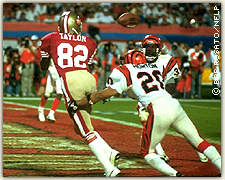 "All
I could think was, 'Catch the ball,'" said Taylor, who had been suspended
at the start of the season for violating the league's drug abuse policy.
"I was just trying to draw a defensive back, but when I turned around,
no one was inside."
"All
I could think was, 'Catch the ball,'" said Taylor, who had been suspended
at the start of the season for violating the league's drug abuse policy.
"I was just trying to draw a defensive back, but when I turned around,
no one was inside."
Montana broke out in a wide grin and pumped his arms. He had done it again, marching the 49ers 92 yards in 11 plays to take the lead with just 34 seconds remaining. Mike Cofer's extra-point kick made it 20-16, which stood as the final score after the Bengals failed to move the ball out of their own territory in the final half-minute.
Never before had a Super Bowl been won on a touchdown so late in the game. Leave it to Montana to change that.
"I just hope now they'll stop saying, 'He's right up there with the best,'" Cross said. "He's the greatest big-game player I've seen, period."
For Cincinnati, the defeat was crushing. "You're 34 seconds away from a glorious victory and the next thing you know, you are using all the cliches you use in a losing locker room," quarterback Boomer Esiason said. "It is a very frustrating feeling. When you come so close to the top of the mountain and lose it this way, it really hurts."
Bengals Coach Sam Wyche fought back tears. He had almost beaten his mentor, 49ers Coach Bill Walsh, only to be outfoxed by Montana. Ironically, when Wyche was a rookie quarterback coach for the 49ers in 1979, his first pupil had been Montana, a rookie out of Notre Dame.
"I don't know of anybody," Wyche said, "who can play as well in the clutch as Joe does."
It was a smashing ending to what had been a mysterious season for San Francisco. The 49ers, who at one point were a dismal 6-5, went through a quarterback controversy when Walsh kept using Steve Young over Montana, and they survived an ankle injury to Rice and a lackluster passing attack.
It was the sweetest Super Bowl for Montana, who labeled this comeback the best of his career, and for Walsh, who became only the second head coach to win three Super Bowl rings (Pittsburgh's Chuck Noll won four). Walsh then decided to go out on top, announcing four days after the Super Bowl that he was retiring as coach and moving into the 49ers' front office.
Walsh undoubtedly was one of the great coaches of his era. But he also was blessed with some great players over the years, with Montana, Rice and Craig foremost among the standouts on his third world championship team.
49ers couldn't get into an offensive rhythm in the first half, settling for a 41-yard Cofer field goal despite a couple of good scoring opportunities. One drive ended at the Cincinnati 2-yard line when Cofer, hurt by a bad snap from Cross, hooked a 19-yard field-goal attempt. Then after the 49ers forced the Bengals to punt and Taylor set a Super Bowl record with a 45-yard runback to the Cincinnati 46, Craig lost a fumble three plays later. Fulcher knocked the ball loose after Craig had rambled for 16 yards.
The Bengals, however, were having even less offensive success, managing only 93 first-half yards. Esiason, who came into the playoffs with a sore finger on his left (passing) hand, continued his erratic throwing with a four-for12, 48-yard half. The Bengals' only score came on a 34-yard field goal by Breech to tie the game at 3-3 with 1:15 left in the half.
Not since Pittsburgh led Minnesota, 2-0, in Super Bowl IX had so few points been scored in the first half. But more important for Cincinnati, Krumrie couldn't play. He had broken his left leg in two places midway through the first quarter, costing the Bengals their best interior tackler and inspirational leader. The 49ers were weakened when offensive tackle Steve Wallace broke a leg on the game's third play.
When the Bengals opened the third quarter with a sustained drive that began at their 14, Esiason and his mates finally appeared to be in sync. Cincinnati, the league's top rushing team, had hoped to pound the ball on the ground behind its large offensive line, but San Francisco's quicker defenders had cut into that tactic. On this drive, however, Esiason threw completions of 23 yards to Collinsworth and 20 to running back James Brooks, then 11 to Collinsworth for a first down at the San Francisco 22. It was time to turn to muscle.
But the 49ers had more. They limited Woods to a three-yard gain, then dropped him for a one-yard loss before Esiason's third-down pass fell incomplete. Breech had to come on for a 43-yard field goal. The Bengals led, 6-3, but after a possession consuming 9:21, they still didn't have a touchdown. It was a disheartening turn.
"I think we were successful because we played disciplined defense against them," San Francisco safety Jeff Fuller said. "We had noticed on film that Ickey likes to cut back and defenses were playing soft and overpursuing. We stayed in our assignments and when he cut back, someone was there to stop him."
San Francisco already had forced the Bengals to scrap their no-huddle offense, which was designed to limit an opponent's ability to shift players into and out of the lineup for special situations. The 49ers liked to substitute freely, but they decided to go with basic defenses and refrain from shuffling personnel.
"By not trying to outthink them but just play solid defense, we didn't get confused," Fuller said.
The 49ers spent halftime making some offensive adjustments to neutralize Fulcher, who had been sensational. They started using two tight ends, trying to cut down on the effectiveness of his blitzing, and they concentrated on running away from him. Slowly, the change worked.
"In our defensive strategy, my job is to force the run inside, but they never seemed to run at me," Fulcher said. "They said they stayed away from me in the second half, huh? To be honest, I think they stayed away from me all day."
San Francisco tied it up, 6-6, on Cofer's 32-yard field goal following rookie linebacker Bill Romanowski's interception of Esiason at the Bengal 23. That score came in the final minute of the third period, but before the teams could change sides, Jennings took the ensuing kickoff and raced through the middle of the 49er coverage team. He reached the end zone 93 yards later without making a single cut. After Breech's successful extra-point kick, Cincinnati had a 13-6 lead.
"I was scared," Lott said, looking at the scoreboard.
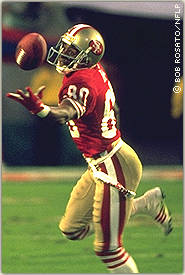 But
the 49ers still had Montana and Rice. On the first two plays of their next
possession, Montana connected with Rice for a 31-yard gain and with Craig
for 40 more and a first down at the Cincinnati 14. Billups should have
intercepted the next pass, intended for Taylor in the end zone, but he
dropped it. So Montana immediately tossed a fade toward Rice, who got a
step on Billups and waved the ball around the goal-line pylon for a touchdown.
Cofer's kick tied it again at 13.
But
the 49ers still had Montana and Rice. On the first two plays of their next
possession, Montana connected with Rice for a 31-yard gain and with Craig
for 40 more and a first down at the Cincinnati 14. Billups should have
intercepted the next pass, intended for Taylor in the end zone, but he
dropped it. So Montana immediately tossed a fade toward Rice, who got a
step on Billups and waved the ball around the goal-line pylon for a touchdown.
Cofer's kick tied it again at 13.
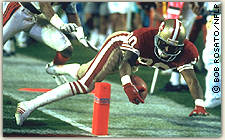
"I just went upfield and headed for the cone," said Rice, whose long arms, strong hands, leaping ability and agility make him so dangerous to cover.
Said Montana: "I knew immediately we had a touchdown if I could throw it right. They couldn't stick with him one-on-one like they tried."
The 49ers lost another scoring opportunity on their next possession when Cofer missed a 49-yard field-goal attempt. The Bengals responded with an 11-play drive that was sparked by Esiason's 17-yard completion to wide receiver Ira Hillary on third and 13. Woods ran 10 yards for a first down in 49er territory, and Esiason hit Brooks for 12 yards and another first down.
"The middle of our line was controlling things," Bengals tackle Anthony Munoz said. "Right then I felt we were going to win it."
At the 49er 22, Breech gave the Bengals a 16-13 lead with a 40-yard field goal. That set up the scintillating final three minutes in which the 49ers gave the NFC its fifth straight Super Bowl victory.
Montana's marvelous game-winning drive left the Bengals, who had suffered a dismal 1987 season (4-11) that almost cost Wyche his job, just 34 seconds short of winning the Super Bowl. That's why the loss hurt so much.
"After Jimmy kicked that field goal, with the way the defense had been playing, I figured this was going to be a sweet ride home," Esiason said.
Said Woods: "We're kind of feeling sorry for ourselves. To lose the game like that is devastating. We played a whale of a game and we should have won, but we didn't."
One man who had played better games but won anyway was Cross. The 13-year veteran avoided wearing the goat horns when his teammates overcame his bad snap on Cofer's errant chip shot and his costly penalty on the last drive. "I will be no more than a little footnote in the game," he said.
As a newly retired player, Cross was able to put the game itself in historical perspective.
"You know," he said, "finally, after 23 years, the Super Bowl is finally super. This is a game you can look back and say, 'That was a great game."
| Super Bowl XXIII: 49ers vs. Bengals | |||||
| Joe Robbie Stadium, Miami, Florida | |||||
| Attendance: 75,129 | |||||
| MVP: Jerry Rice | |||||
| Winning Coach: Bill Walsh | |||||
| Cincinnati Bengals | 0 | 3 | 10 | 3 | 16 |
| San Francisco 49ers | 3 | 0 | 3 | 14 | 20 |
| SF - FG Cofer 41
(11:46)
Cin - FG Breech 34 (13:45) Cin - FG Breech 43 (9:21) SF - FG Cofer 32 (14:10) Cin - Jennings 93 kickoff return (Breech kick) (14:26) SF - Rice 14 pass from Montana (Cofer kick) (0:57) Cin - FG Breech 40 (11:40) SF - Taylor 10 pass from Montana (Cofer kick) (14:26) |
|||||